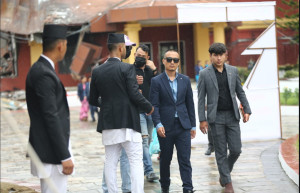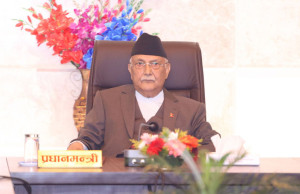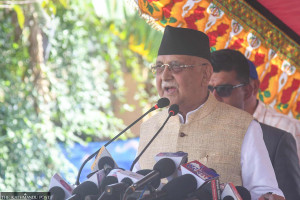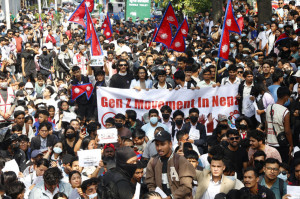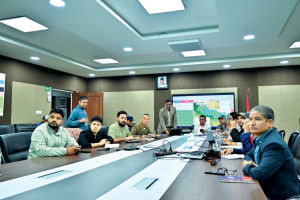Columns
The façade of Shital Niwas
Will President Paudel violate constitutional provisions if they are contrary to Cabinet recommendations?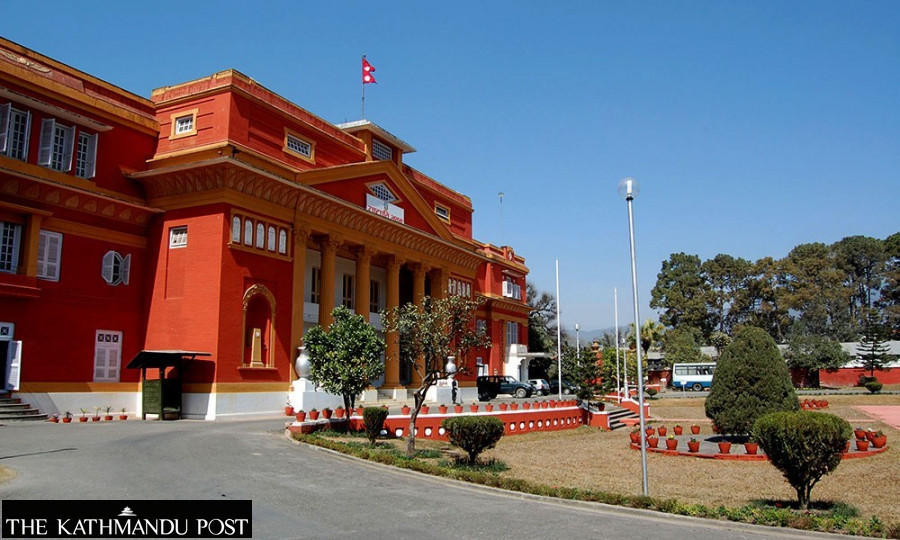
Semanta Dahal
Since the 2015 Constitution proclaimed, “There shall be a President of Nepal”, controversy has been the metonym of the presidency for the three individuals who assumed the ceremonial office. While some controversies had acute constitutional implications, others were raised to gain political advantage.
Within eight months of being elected, President Ramchandra Paudel has already received criticisms for swiftly endorsing the Cabinet’s recommendation to remit the sentence of murder convict Yog Raj Dhakal and for assenting to the Citizenship Act Amendment Bill rejected by former President Bidhya Devi Bhandari but passed during the previous parliamentary term. Bhandari was not a stranger to controversy either. Withholding a Bill passed twice by Parliament was constitutionally inappropriate. Not to mention the controversy she stirred by mediating the intra-party power politics. The first President, Ram Baran Yadav, tried to distance himself from constitutional controversies, but the episodes that played out in the sacking and reinstatement of the then Chief of Army Staff Rookmangud Katawal and the appointment of Lokman Singh Karki at the helm of the Commission for the Investigation of Abuse of Authority left a crack in his tenure.
From regal to republic
Nepal’s experiment with republicanism is recent and short, as the country was ruled under a dynastic monarchy for 240 years. There were a few intervals of constitutional monarchy’s power-sharing arrangement, but absolute monarchy stood in the larger part. When Nepal was declared a republic, the nation had just broken the shackles of absolute monarchy. So, when the Interim Constitution of 2006 was being promulgated, there was a consensus that the head of state should not be endowed with significant powers.
Compared to the 1990 Constitution of the Kingdom of Nepal, which vested the executive power to the King and the Council of Ministers, the Interim Constitution granted it only to the Council of Ministers. The original text of the Interim Constitution did not contain any provisions pertaining to the President, and even after introducing provisions related to the President by the Fourth Amendment to the Interim Constitution, the executive power was provided only to the Council of Ministers. The new provisions on the presidency included in the Interim Constitution did not elaborate on the functions and duties of the President; however, it stated that the President shall perform the functions in accordance with the constitution and the law. Moreover, it clarified that the President had to comply with and protect the Constitution.
Acceptance of consent
The Constitution promulgated by the Constituent Assembly in 2015 consolidated the role of the President. In addition to the provisions already prescribed in the Interim Constitution, a new role was introduced for the President to promote national unity and a new doctrine of recommendation and consent. However, this new doctrine of recommendation and consent has striking similarities with the provisions of the 1990 Constitution of the Kingdom of Nepal. Even the 1990 monarchial constitution required the King to exercise his powers upon the recommendation, advice and consent of the Council of Ministers.
The doctrine of recommendation and consent, in Article 66 of the Constitution, states that the functions of the President have to be performed upon recommendation and consent of the Council of Ministers. Under this provision, the prime minister must present the recommendation and consent of the Council of Ministers to the President. Unlike the constitutions of other parliamentary republics, such as the Indian Constitution, the provision in Article 66 does not empower the President with the right to return such recommendations for reconsideration to the Council of Ministers. The Constitution does not further elaborate whether or to what extent the recommendation and consent of the Council of Ministers is binding on the President. Neither has the Supreme Court, so far, explicitly expressed its opinion on this issue. However, the constitution is unequivocally clear that the President is obliged to assent to the Bills passed by Parliament following the President’s request for reconsideration.
Dissenting the consent
In the absence of the Constitution’s mandatory provisions binding the President and the lack of the right to send the recommendation back for reconsideration, will the President violate the Constitution if he or she acts contrary to the ministerial recommendation?
Before tackling this question, it is worth noting that under Article 81 of the Constitution, the President can demand the Prime Minister to furnish necessary details regarding the Cabinet decisions. Therefore, the President is entitled to request further materials from the Prime Minister if he or she doubts the constitutional and legal backing behind the recommendation. Following the submission of further materials, if the Prime Minister fails to show that the recommendation does not violate the clear and mandatory provisions of the constitution, the President, in preserving, protecting and defending the constitution, will be well within the constitution to sit on, or in extremely rare cases of constitutional breach, to set aside the piece of Cabinet’s recommendation.
If the President dissents the Prime Minister, unlike against the monarch in a monarchy, the President is exposed to a parliamentary exercise of removal by impeachment in the republic. A motion of impeachment can be initiated against the President on the grounds of serious violation of the Constitution. The President is a ceremonial head, but behind the powerless façade of Shital Niwas, the constituent assembly has built a bulwark of the constitution.




 14.64°C Kathmandu
14.64°C Kathmandu







